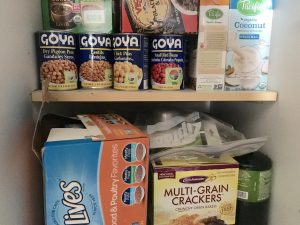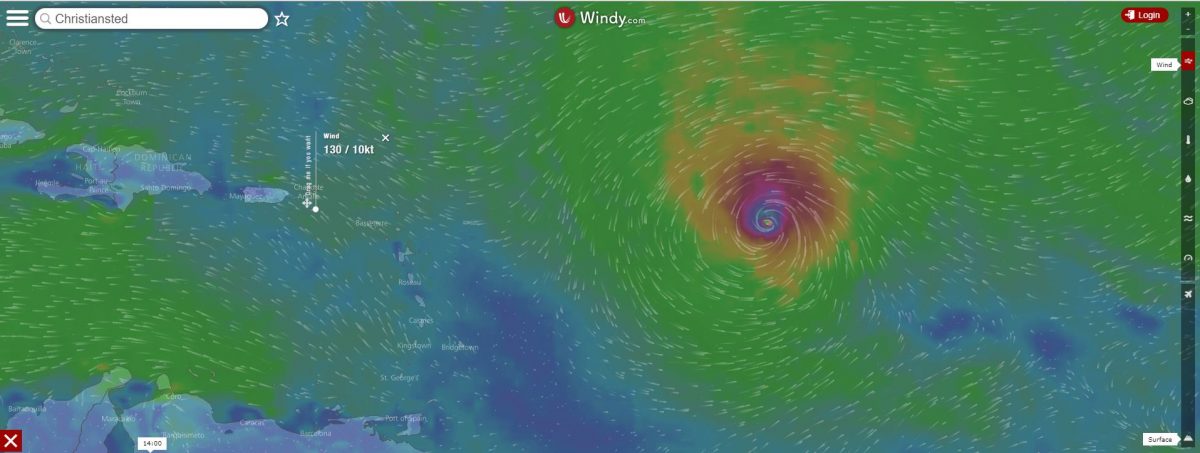Note: Updated August 25, 2019
Well, here we go again. Watching and waiting to see if Hurricane Irma will skirt us or make a direct hit on the Virgin Islands. Keeping a storm watch and weathering them is simply part of life in the tropics. Currently, Irma is still too far out to really tell if she is going to come knocking and she’s thankfully, a small storm so far. However, she’s expected to expand from the current 25-mile radius from the eye and she may get uncomfortably close to St John and St Thomas. If she continues just a little more South on her current track before turning North again, she could make a direct hit on St Croix. So – now is the time for hurricane preparedness!
Update 2019 – Irma did hit and she wasn’t small ? — Irma devastated St Thomas & St John as a Category 5 Hurricane on September 6, 2019; 2 weeks later on September 20th Maria hit St Croix as a Category 5 causing widespread destruction before hitting Puerto Rico. You can read more about the Irma & Maria aftermath here … After “glamping” at home for 4+ months with no power – I can tell you that I stand by the list below. I’ve added a few additions at the bottom as well.
All 3 islands are doing well now, lush and green, and are mostly recovered.
Rule of thumb: Prepare for the worst; Hope for the best
Here in the islands, the beginning of September marks the beginning of prime hurricane season. September through Mid-October are when we’ve been hit with the worst. So, whether or not there was an impending storm, it was time for me to take a good look at my hurricane kit – and it was lacking! So, I stocked up last Thursday. From the current NOAA Hurricane Center models, it was smart. Thankfully a lot of my fellow islanders have heeded the warnings as well and are shopping and preparing their homes to weather the storm. For those who are newer to the island or planning to visit, I thought I’d expand on a previous article I wrote a few years ago while waiting for another storm. You can read that here: Keep Calm and Drink Rum
Watch the Weather Closely during prime season
Starting at the end of August, I start monitoring the NOAA Hurricane Center on a daily basis. The folks at NOAA are the source for a lot of the forecasts you see on the Weather Channel and in local forecasts. So, I not only look at the maps, but I read the Discussion section for each storm in the Atlantic. The site is updated on the 5s and 11s (5am; 11am; 5pm; 11pm) and as a storm is imminent they usually add 8am and 8pm forecasts. At each of these hours, a NOAA forecaster looks at the maps and reads through the data and gives a more understandable reading of them. I’ve found for several storms that their discussion has more accurately predicted the way the maps and models change. So right now, they are the driving factor for me being uber prepared for what may be the hit of a Major Hurricane. (Irma is predicted to be a Major Category 4 on the Saffir Simpson Scale as she approaches the USVI).
Additionally, I follow some helpful Facebook pages that are focused on Tropical Weather. Check out:
- US Virgin Islands Tropical Weather Station
- NOAA Hurricane Hunters These men and women who literally fly into the eye of the storm are Ah-mazing! They typically fly out of St Croix at this time of year, I love seeing them on the island and am quick to thank them. If you see them out in their flight suits – be sure you do too!
- NOAA NWS National Hurricane Center
- American Red Cross the Virgin Islands
Downloadable Weather Apps
A few of the apps that I’ve found useful and have seen friends recommend to not only follow the weather but be prepared in the event that we are hit (which is thankfully not often in my 16 years here!) are as follows:
- Wunderground App – I use this app daily and find it to have the best forecasts and maps for the US Virgin Islands weather. There’s even a handy hourly rainfall predictor that I’ve found to be pretty darn accurate (which is really handy when I’m planning outdoor destination weddings!)
- Windy.com – A cool app that shows wind direction, clouds, radar, etc. Gives you a really great visual of how the storm may move based on airflow. The website also has great interactive maps! www.windy.com
- American Red Cross Emergency Alerts and Notifications – This is an app that I think everyone, everywhere should have! It will send you notifications based on your location (you have to turn location services on).
- You should also download and save this handy guide Tropical Cyclones: A Preparedness Guide by NOAA, FEMA, and the Red Cross. It’s chock full of really excellent info no matter where you live.
What to do if you are flying into or out of the islands
Of course, St Croix and the US Virgin Islands are gorgeous places to visit year-round. And like anywhere else in the world, we can’t predict when a storm will hit more than a few days out. If you are concerned about travel plans – contact your airline directly. You may be able to change your flights just before a major storm hits. However, keep in mind that airlines are not responsible for weather-related delays or cancellations. Otherwise, they would go out of business! Often you can get re-routed just before a storm if the change is storm-related. I ALWAYS recommend travelers insurance. Particularly when you are traveling during Hurricane Season or during winter months when snowstorms can affect you. I recommend purchasing the add-on insurance when you purchase your airline tickets. You should also check your credit card terms to see if they offer weather delay or cancellation reimbursement.
Be sure to contact your destination hotel or villa to find out what their Hurricane and weather policies are. You may be able to change your dates without a penalty, but you need to check with them in advance.
A handy tip to know when flying worldwide any time of the year is that even if a delay is weather-related, airlines often have deals with local hotels for “Distressed Traveler Rates“. I’ve used this myself more times than I care to count when I’ve been delayed by weather. I’ve gotten $75/night rates at Marriot Hotels in Miami and San Juan. If you experience a weather delay – go to the nearest gate and ask for a list of Distressed Traveler Rates. Often the rate will be listed and the contact numbers and you can quickly start calling to find availability near the airport. You can also call local hotels directly and ask if they offer these rates. Be sure to call the local hotel reservation desk directly, don’t call the 800 numbers. Sometimes you can even find cheaper rates online – so if you are price conscious and feel ambitious, check those out too.
If you are delayed en route for mechanical reasons, calmly and kindly approach the desk and ask if the airline will put you up in a hotel until you can fly out. Patience and a kind smile go a long way. Remember that airline employees are often stressed during these delays too.
Back to Preparing for the Hurricane

I can’t stress enough how important hurricane preparedness is. As soon as I heard that there was potentially a big, bad storm on the way, I stocked my hurricane kit.
Here are some of the things that I make sure to have:
- A good, water-proof flashlight and plenty of extra batteries
- A battery-operated lantern. You don’t want to use candles during the storm. Wind can blow them out, or worse, blow them over!
- Battery chargers for my iPhone and iPad
- A battery-powered radio to keep informed before, during and after the storm if cell towers go down. I’m also planning to order this solar/hand-cranked NOAA radio/flashlight but it clearly won’t arrive on time for this storm 🙁
- A gas grill! I picked up a great little tabletop propane stove that will work perfectly if I need to cook outside after the storm (it will be HOT inside) and it can double duty for a fun trip to the beach (where I’d much rather use it thank you)
- Canned goods and non-perishable food. Things you can literally eat out of the can without cooking if needed. Beans provide plenty of protein and will last me through the winter if I don’t need them now. (I make a lot of chili!).
- Stock up on boxed almond and coconut milk (or cows milk if you drink that too) as it lasts without refrigeration.
- Packages of nuts, dried fruit, etc. for energy and something sweet.
- Chips and comfort food to keep me
happycalmer during the storm! - Extra pet food to last for a couple of weeks – you’ll go through it eventually anyway!
- Wine, Cruzan Rum, Mixers, whatever it takes to get you through it in good spirits!!
- Water, Water, Water. Here in the islands most of us have cisterns instead of basements. Cisterns collect rainwater for household use. In a bad storm, they will get contaminated with saltwater – so you need to be sure that you have plenty of fresh, drinkable water for each member of your household for several days. And don’t forget it gets hot after the storm, so have extra. I buy gallon jugs and stock my freezer full. This keeps the freezer cold longer if the power goes out. And, once it melts, it’s still drinkable. I take used jugs and fill them with tap water and stack them in my shower to use to flush the toilet, for my dogs and for washing.
- I also buy additional bags of ice and stuff them into any leftover space in my freezer. This way, when the power inevitably goes out, any food I have in there has a chance. If I have any frozen food, I’ll cook that first and move anything perishable from the fridge into the freezer to act as a super cooler. Anything I know I want to access, I put into a cooler in the kitchen with a couple of frozen water jugs. This will extend the life of any perishables I have.
- Trash bags. You’re going to want heavy-duty trash bags to secure your computers and electronics, important pictures and mementos, etc.
- Plenty of bug spray, citronella candles, and torches, etc. After the wind and rain die down, the mosquitoes come out. In droves. ‘Nuff said.
2019 Hurricane Preparedness Additions after living through Maria
- CASH MONEY! Following Maria, the island was without power. While banks did their best to get back online as soon as possible, with the curfews and few working ATMs, the lines were over an hour-long at ATMs. With limited power and even more limited internet and phone – stores were only taking cash for a week or two.
- Bottles of Bleach and Rubber Gloves. Cleaning up in the aftermath of a large storm, you’ll want plenty of bleach to combat the inevitable mold that occurs from the damp tropical air. I recommend having several large bottles. Though if it’s a bad storm and there is lots of damage – you’ll likely need more.
- More bug spray. I simply can’t stress that one enough!
- A good first aid kit. Make sure you have plenty of alcohol, hydrogen peroxide and antibacterial ointment for all of the inevitable cuts and scrapes that result from digging out of fallen trees, limbs and other debris. And make sure you are up-to-date on your Tetanus shot. There will be a huge shortage after a bad storm.
- A really good, sturdy cooler. For extended periods without a working refrigerator. (I didn’t have one for 4 months since I didn’t have power)
- Healthy, just-add-water, prepared meals. Especially if you have dietary restrictions like me (I’m gluten-free) or you are vegan, be sure you have lots of meal options to carry you through. It was really hard for several weeks to stay gluten-free (read IMPOSSIBLE) The MRE’s we were issued were full of sugar, carbs, and gluten. When you are already tired, stressed and hungry – you’ll eat anything. But the resulting health issues make things worse, not better. Following a storm and during recovery you NEED to be at your best health.
I really like the Good to Go camping meals! They are healthy, gluten-free and many are vegan. And they are tasty too! - Grab some good books you’ve been waiting to read. You’ll need something to distract you when the power goes out.
- Download as many Netflix movies and shows onto your devices as you can. As long as your devices are powered, you’ll have some entertainment. It makes a world of difference when it’s pitch dark at 7 pm.
When a Hurricane Watch has been Issued
- A Hurricane Watch means that hurricane conditions are possible within 48 hours. Hurricane preparedness is crucial.
- This is the time to make sure that your hurricane shutters are up (or if they are easy to install, that they are ready to go). Don’t wait to find you are missing pieces or something is broken. Give yourself plenty of time and get help if you need it!
- Clean up any debris in your yard and trim back trees that could affect power lines.
- Secure lighter outdoor furniture and plants – bring them inside if needed. Sink outdoor furniture in your pool if you have one. It can’t fly away.
- Fill up your vehicle gas tanks
- Wash all your laundry – it may be while before the power comes back on.
- If the power is out and you need something, card machines and ATMs may be down. Have extra cash on hand!
- Check on your neighbors. Storms bring communities together. Make sure your neighbors, particularly seniors, are prepared. Once you’ve got your prep done, lend a hand where needed.
When a Hurricane Warning has been Issued
- A Hurricane Warning means that hurricane conditions are expected within 36 hours. This is the time to make sure that all of your final preparation is completed
- Make sure that all outdoor furniture and other items are properly secured or brought inside.
- Put computers and electronics in heavy-duty trash bags and secure them off the floor in an interior room or closet least likely to get wet.
- Plug in all of your battery backups, your phone, tablets, etc to make sure they are fully charged BEFORE the power goes out.
- Put together a backpack or go-bag with the following:
- Make sure you have cash and your car keys.
- Important papers (IDs, passports, etc) in sealed ziplock bags.
- A dry set of underwear and socks into a ziplock along with a change of clothes if it will fit.
- Nuts, Trail mix, Snack bars and a bottle of water
- Medications for you and/or your pets
- Leashes for your dogs
- If you have cats, make sure you have carriers handy if you need to evacuate.
- Take a long shower! Again, the power could be out for an extended time. This will help you to relax a bit and you’ll be glad you did.
- Be sure you have a safe place to ride out the storm and that your pets are safe and secure too!

After the Storm
- Check your immediate area for storm damage and be sure to listen to the radio for updates
- Check on your neighbors to see if they are ok and/or need help
- If you have damage to power lines be sure to report it to WAPA (if you are in the USVI)
- WAPA Emergency or After Hours: St. Thomas/St. John 340-774-1424 | St. Croix 340-773-0150
- Report outage online: https://www.viwapa.vi/Customers/ReportAProblem.aspx
I hope this list helps you prepare for any storm no matter where you are. Be prepared and hope for the best. The most important thing is not to panic – you’ll be fine. Just be ready to camp out at home for a while. If you’re prepared, it’s just like glamping at home 😉
I know many of my fellow sur-VI-vors have other tips as well. Drop yours in the comments below!! #vistrong

